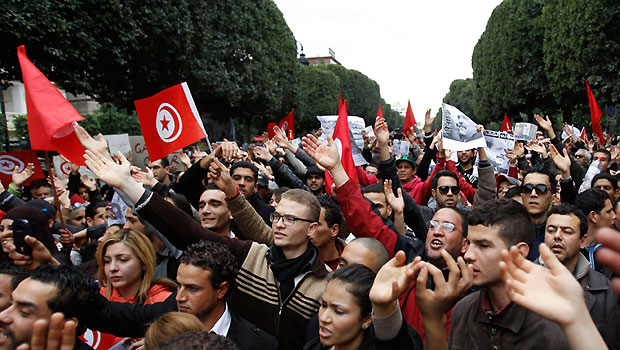Today, the leaders of the Ennahda Movement in Tunisia are rushing to dominate the forthcoming elections, whether via legitimate or illegitimate means. In the first place, for Ennahda even reaching power was akin to a dream coming true or a lucky strike that will not be repeated, especially given that the Tunisians have learned much from the Ennahda dream—a dream that turned into a terrible nightmare.
Following four incidents that turned the country upside down, it may be that the conditions needed to govern do not exist anymore. The four incidents, which occurred as result of ignorance of democracy and the rules of management, will lead to Ennahda’s utter failure in the upcoming elections.
First was the assault on the US embassy that occurred on September 14, 2012, the same day that an Ennahda-affiliated minister incited worshipers in a mosque to demonstrate in front of the embassy, tempting some Salafists and members of the Leagues for Protection of the Revolution (LPR) into carrying out the assault. Ennahda supporters thought that this attack represented a flexing of their political muscles; however, as usual, they failed to organize their efforts, and ultimately nobody claimed responsibility. By failing to protect the US embassy, the government failed to respect international relations, and a government that fails to protect foreign missions on its territory will not remain in power for long.
The second incident is the attack that the LPR launched on the General Union of Tunisian Workers (UGTT). The LPR are basically militias run by members of the Congress for the Republic (CPR) that is affiliated with the president and the Ennahda Movement leadership. All reports confirm that they intended to topple the UGTT, forgetting that it had played a significant role in ensuring the success of the revolution. The UGTT was targeted because it guaranteed a political equilibrium, the very thing preventing Ennahda from dominating the political scene. People in Tunisia do not believe in the government or in the country’s leading troika as much as they do in the secularist leadership of the UGTT. The majority of Tunisians today view the secularism of the UGTT members as a form of patriotism, while they see the faith of some Ennahda members as an act of treason; thus, they prefer the secular democratic UGTT over their current leaders. This incident demonstrated Tunisia’s instability, and a government that does not protect its national organizations is incapable of securing stability.
The third incident was the assassination of Chokri Belaid, which was the result of the negligence of the Ennahda government. Of course, I say “Ennahda” because this government is dominated by the Ennahda Movement, while the CPR is an offshoot of it. As for the Democratic Forum for Labor and Liberties, it only makes up one fifth of government. Some Ennahda figures antagonized Belaid in a manner that can be considered a political assassination. For example, the then-minister of the interior, Ali La’arayedh—who has since become prime minister—accused Belaid of being behind the social mobilization. Belaid was a smart politician who recognized Ennahda’s desire to dominate the state as if were its owner. Most Tunisians expected something terrible to happen, and that included Chokri Belaid himself. On the day of Belaid’s funeral, the mask fell twice. First was when they we saw the LPR—despite calling themselves the conscience of the revolution—interrupt the funeral of the real revolutionary leader who participated in all the demonstrations; they truly are the distorted conscience of the revolution. Second, the LPR appeared on television on January 13 to defend ousted president Zine El-Abidine ben Ali. With this incident, the government failed to maintain the security of individuals and groups. What can a powerless government do but be patient? But people want a strong—not patient—government. They will not vote for those who give their blessing to assassination, support violence, or lie deliberately. In other words, Ennahda will awake from the dream and only the honest among its members and among Tunisians in general will prevail.
The fourth incident was when the national army’s heavy artillery shelled Jebel ech Chambi after some Salafists targeted the brave among us. The Ennahda leadership called these Salafists their “sons,” and asked them to wait until they were in control of the army, border guards and police force. These Salafists are supported by some of the Salafist members of Ennahda, and everyone knows who they are. They are also supported by external organizations affiliated with some of the Ennahda movement’s well-known businessmen. In fact, we must credit the leader of Ennahda for wisely claiming that Tunisia is not a land for jihad. I believe it was a wrong decision for him to join Ennahda, and he must now know that Tunisia comes first—even before the party and authority. The incident of Jebel ech Chambi was the tipping point for Ennahda, which, after joining the bloodletting there, needs to reconsider its decision to run the civil affairs of the state. This incident marked the collapse of civil peace. In fact, we have a false government whose ministers are protesting in the streets.
The four incidents mentioned above disrupted people’s trust in the government and the Ennahda. In other words, Ennahda’s final fig leaf has fallen.
Radical fundamentalists and Takfirists, such as terrorist groups, prefer to live in swamps; as for those in Ennahda, they will remain, but leave. Only those who adhere to the civil aspect of Tunisia will be able to stay. Let us dream that Tunisia is ruled by everyone, a land that is open to everybody and whose sun shines on everybody… but a difficult land for the hypocrites.
You can read the counterpoint to this debate here.
